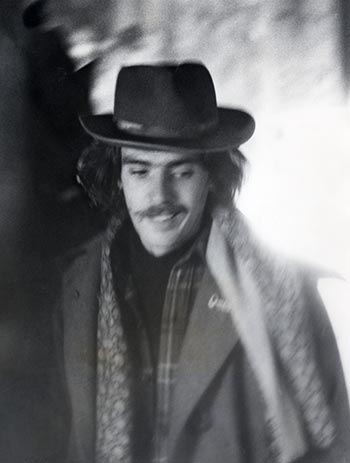St. Elmo’s Fire
Author: Albert d'Ossché
Date/Studio: 1984 Altman, San Francisco, CA
Engineer: Sandy Stone
Producer: Robert Force
Original Release: Outtake from Moon Fell on CA (KM318)
Current Release: The Complete Recordings (BSR 158)
 I like to think that this song of Albert's was the one he was looking for before he turned the corner and began to write of the things that contented and delighted him in this life. Our journeys of using our songs to catch the candle-flicker of cosmic truth were similar paths. It would have been wonderful to hear his take on grandchildren, about the maturing of romantic love, of friends who have passed. But that was not to be. He was the one who passed by us. Early. Tragically. To many people's sorrow.
I like to think that this song of Albert's was the one he was looking for before he turned the corner and began to write of the things that contented and delighted him in this life. Our journeys of using our songs to catch the candle-flicker of cosmic truth were similar paths. It would have been wonderful to hear his take on grandchildren, about the maturing of romantic love, of friends who have passed. But that was not to be. He was the one who passed by us. Early. Tragically. To many people's sorrow.
In Santa Cruz, CA he found two of the great loves of his life. She and her four-year old daughter became the cornerstones of his existence. They lived in a small house a few blocks from the beach. He worked at the Beach Boardwalk restoring antique carousel horses. The benign climate laid to rest his, “I'm always cold,” complaint. Indeed, his hands were like ice most of the time.
It was the early 80s. In Search had become a best-seller. Our first two albums were out. A third was in the can. Bookings were coming in for major city concerts, not just at colleges and festivals. We were moving up, getting on radio and television. National Public Radio was using one of our tunes as a segue to the news. He discovered he was a Barbecue King. No one could do the meat like Albert, in the oven or on the patio. He was-- for the most part-- unqualifiedly happy for the first time in his life.
He was “sitting in” with people like Neal Hellman on his Seven Bridges Road cut from Appalachian Dulcimer Duets. (He showed up in a white fedora, suit coat and ascot. When asked if he wanted to hear it first he put on the earphones and desultorily waved his hand. We ran the track and he laid down his part. He listened to it back, nodded, put his instrument into the case, tipped his hat and walked out. One-take Al.) He was the producer of what to become a seminal album, Elizabethan Music for Dulcimer by Randy Wilkinson. And he had a home life that included a fire-ball four-year old.
This song was written in that atmosphere. He went to the ocean and had a surprise. “And when I saw you standing there, love burned in my eyes.” He allowed himself to be swept up by a gentle grace and “saw at last that I was free from destiny and fate.” The fragile, lonely boy who had been bounced from every home he had ever known and, in the name of education (and convenience), slipped in with strangers, was freed from the destiny of loneliness. Laughter had begun to live in his deep, brown eyes.
They were magical years. I don't know why the relationship fell apart. It did. Things change. We never talked about it. When we went into the studio to record When the Moon Fell on California in 1983, this song was on the punch list and it did get recorded. Our engineer, Sandy Stone, liked the cut so much she thought we could do better and ought to shelve it and bring it out later. Besides, it didn't really fit the general zaniness of the rest of the album. We agreed. The out-take sat in the can for over thirty years until I released the rough-cut of it on the Complete Works of Force and d'Ossché.
Musically, the song was a turning point for both of us. Albert had finally come to peace with what he thought was the odd tone of his voice which he characterized as being more like a Jewish cantor. It had strong character, that's for sure. It wasn't pretty but when he sang it was real, immediate, believable. On the cut, the free-flowing lead lines I am playing on the bass strings was a new direction for me that afterwards continued to show up in my performance but never got recorded again until the Manitou cd.
By the middle 80's he was looking for new directions and to leave Santa Cruz. Film attracted him and he apprenticed to filmmaker, Jim Begg. That connection took him to Hollywood where he began a life as a producer for New World Productions until his death in 1990. While working on an election campaign he met and later married, Colleen Harmon. He and I still gigged up to just before he passed.
